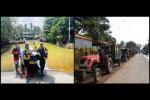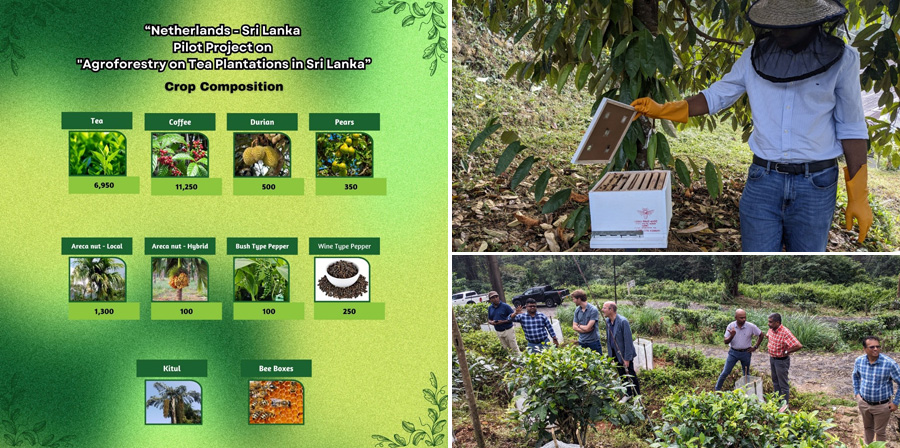The project was developed through a multi-stakeholder partnership involving the Government of the Netherlands, the Netherlands Enterprise Agency (RVO), the Embassy of the Kingdom of the Netherlands, Wageningen University & Research (WUR), the University of Peradeniya’s Faculty of Agriculture and PGIA, the Tea Research Institute of Sri Lanka, Kelani Valley Plantations PLC, and the International Union for Conservation of Nature (IUCN) – Sri Lanka.
The initiative aims to rehabilitate degraded tea and coconut plantations in Sri Lanka through sustainable land-use practices, with technical support from IUCN.
Agroforestry is a science-based land management system that integrates trees with crops to revitalise degraded lands.
It simultaneously enhances productivity, regenerates ecosystems, and supports livelihoods by leveraging the synergy between ecological function and economic opportunity.
After careful analysis by the expert panel of scientists, Halgolla Estate was selected to lead the full implementation of the ‘Tea-Based Agroforestry Pilot Project’, reflecting KVPL’s strong commitment to the initiative.
A Letter of Intent (LOI) was exchanged between the Netherlands Enterprise Agency (RVO) and Kelani Valley Plantations PLC prior to the project’s commencement.
Dr. Roshan Rajadurai, Managing Director of the Hayleys Plantations sector, noted that “agroforestry systems help improve land productivity while embedding ecological stability into plantation operations, creating long-term value for the agri-business model.”
During Phase 1, Halgolla Estate achieved significant milestones.
Over 14,000 plants including coffee, arecanut, pear, durian, and spices like pepper were planted across a 5-hectare plot, alongside a pilot beekeeping initiative.
Halgolla Estate was selected as the pilot site due to its unique ecological diversity and potential for early impact. T
he estate presented both environmental challenges and opportunities, including existing wild coffee and kithul palms, which offered an immediate path to generate income while building climate resilience.
The pilot aimed to address soil degradation, biodiversity loss, and declining productivity through a science-based agroforestry model tailored to the estate’s conditions.
Mr. Anura Weerakoon, Director/CEO of Kelani Valley Plantations PLC, observed that “structured agroforestry supports our ESG goals by addressing both environmental restoration and livelihood development, while strengthening the commercial sustainability of estate ecosystems.”
In addition to planting over 14,000 trees and crops, the estate introduced protective measures against wildlife-related damage and initiated structured efforts to formalise wild coffee harvesting and develop a Kithul Tappers Cooperative Society.
These early interventions are enabling Hayleys Plantations to create sustainable revenue streams from the outset of the project, reinforcing agroforestry’s viability as a regenerative and economically sound solution for Sri Lanka’s ageing tea estates.
Speaking on the project’s progress, KVPL’s General Manager - HR and Corporate Sustainability, Dr. Anuruddha Gamage, emphasised that the agroforestry pilot is a core component of KVPL’s broader Environmental, Economic, Social, and Governance (EESG) strategy.
"Our experience at Halgolla Estate reflects both the challenges and transformative potential of sustainable agriculture.
With the support of our partners, we are committed to refining and expanding agroforestry practices that regenerate ecosystems while enhancing livelihoods."
The Netherlands Agroforestry Project also aligns with Sri Lanka’s national priorities on land rehabilitation and climate adaptation.
The project also lays the groundwork for meeting global sustainability benchmarks in agriculture and aligns with Sri Lanka’s commitment to regenerative practices that address land degradation, climate vulnerability, and rural economic resilience.
By integrating agroforestry practices into commercial plantations, Hayleys Plantations is helping chart a new path forward for resilient, sustainable farming in Sri Lanka, one that balances economic opportunity with environmental stewardship.






















